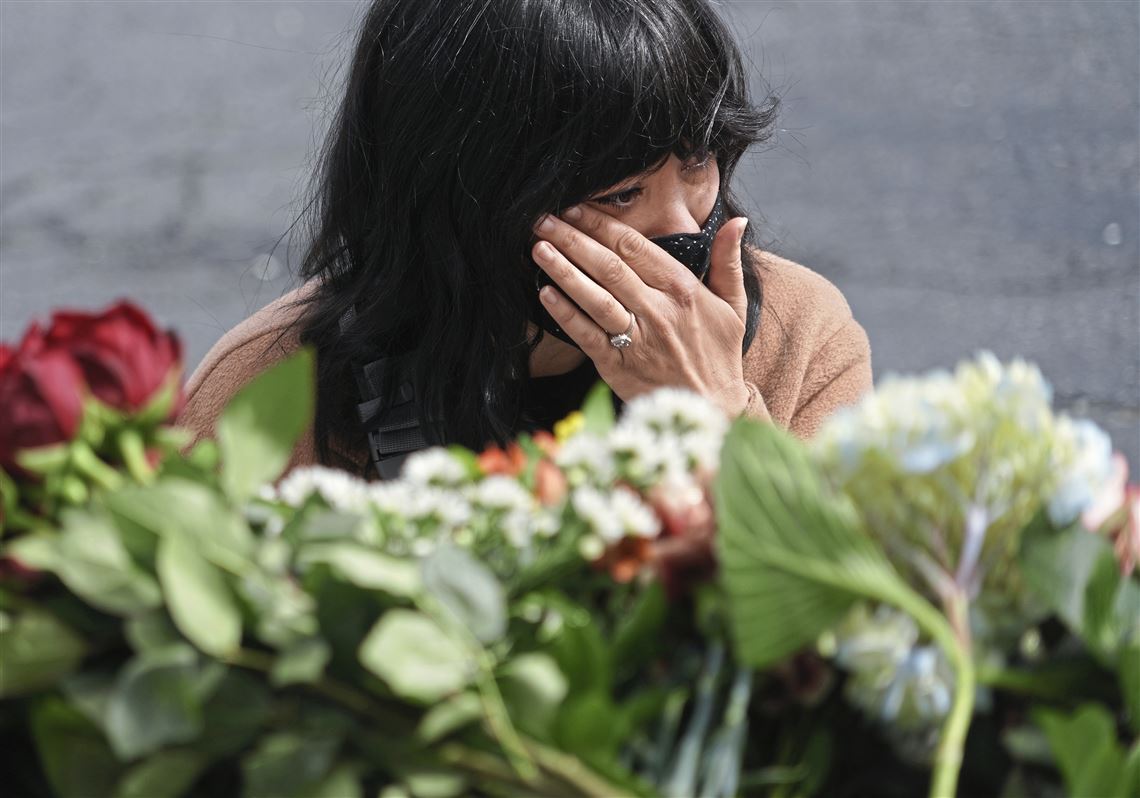Nancy Riley-James, 42, reacts at the makeshift memorial outside Gold Spa on March 18, 2021.
By Bill Schackner
Pittsburgh Post-Gazette
MAR 19, 2021 - Christina Ong, a doctoral student at the University of Pittsburgh, has never been harassed on the street herself, but reading about the rise of anti-Asian incidents nationally made her nervous in recent months to leave her Bloomfield apartment alone.
“I left my house maybe once every two weeks, and that really impacted my physical and mental health,” she said Thursday.
“I generally think I am a really optimistic person and enjoy being around people, but I have these underlying worries that people are perceiving me in a certain way. I am wearing a mask, but they still can tell I’m Asian. So, is there going to be retribution?”
Even before a deadly mass shooting Tuesday in Atlanta drew public outrage, fear had been quietly building for months in cities, including Pittsburgh, where thousands of Asians and Asian Americans live, work and study on its campuses.
Asian women say shootings point to relentless, racist tropes
Irrational rhetoric blaming them for the COVID-19 pandemic, some spread on social media, has added to what some see as a more deeply rooted bias against Asians.
The suspect in the Atlanta attacks told investigators he wanted to eliminate a source of his sexual addiction, police said. But after months of escalating incidents, some violent, it was not lost on many in the general public that six of the eight people killed in multiple massage parlor attacks were Asian women.
Agencies — from the FBI and Pennsylvania Human Relations Commission, to lawmakers and advocacy groups around the country — say they are monitoring the string of incidents.
“The lethal wave of xenophobia and racism towards the [Asian Americans/Pacific Islanders] community calls the ‘Beloved Community’ to lock arms in unity to denounce these acts,” commission Executive Director Chad Dion Lassiter said.
Moved by mounting incidents, Penn State University officials this month reiterated earlier assurances from school President Eric Barron to international students and others, including those of Asian descent.
“You are welcome here,” he wrote. “Your presence enriches our university and the educational experience of all of our students.”
Hundreds in Atlanta rally against hate after spa shootings
Ms. Ong, 28, whose grandparents are from China, is from Sacramento, Calif. She is studying sociology and also works as a researcher for the Asian American Pacific Islander COVID-19 project. As such, she has heard firsthand stories of Asian Americans who have been the victims of harassment. She said women are more likely than men to be harassed in the street, and blue-collar and older individuals are more visible and thus vulnerable.
The problem is affecting behaviors as routine as grocery shopping.
“In conducting interviews with people across the country for this project, I’ve heard stories of people saying, like, ‘Yeah, well, when I’m in the grocery store, I … have to run to an aisle that’s empty because I don’t want to cough or sneeze around other people,’” Ms. Ong said. (continued)
She shares an apartment in Bloomfield but moved home to Sacramento in August, in part because she did not own a car and did not want to rely on a bus — or walking — especially these days.
According to U.S. Census data, 57,000 Asians reside in the eight counties surrounding Pittsburgh, all but about 10,000 in Allegheny County.
Not a new problem
A little over a year ago, there were just 12 confirmed coronavirus cases in the United States, according to the federal Centers for Disease Control and Prevention. None were in Pennsylvania.
Even so, Asian and Asian American students were facing xenophobia and racism, Marian Lien, president of the Pittsburgh chapter of the Organization of Chinese Americans, told the Pittsburgh Post-Gazette at the time. She could not immediately be reached Thursday.
Classmates asked one college student to put on a mask to attend class, even though the student had not recently been to China. Another said dormmates had asked her to move to a single room, Ms. Lien said.
Businesses were affected, too, including one Chinese restaurant owner who said profits at the time were 50% below normal.
Following the Atlanta attack earlier this week, Pitt’s Asian Studies Center posted to its website a strong condemnation:
“Because the victims are Asian, this act of violence, following on other acts in different parts of the country, produces a threat that is profoundly serious and deeply felt by our community of students, faculty and staff,” it read in part.
Joseph Alter, the center’s director, said he has not heard of any high-profile cases of harassment in Pittsburgh. But he said social media vitriol against Asians and cases of violence against Asians in other parts of the country has led to a general sense of anxiety.
“There’s a palpable sense of fear and anxiety amongst the community that we represent,” he said.
“If you are driving to a neighborhood that is new and unfamiliar, and you stop at a red light and a car pulls up next to you, you don’t know what they’re thinking. But you think that they may be thinking about everything that is circulating through social media,” he explained.
“And so it’s incredibly demoralizing. And it produces this kind of pervasive sense of stress.”
Ms. Ong said Asian men and women are often discriminated against in distinct ways.
“Asian men are racialized as emasculated. And that’s super harmful to their psyche,” she said. “Asian women are racialized generally as, like, exotic or … sexual objects, essentially, which is what the Atlanta shooting really exemplifies.”
She added, “I think there might be this misconception that once everyone’s vaccinated, when things are back to in person … all that hate rhetoric will go away. But we know that’s not true.”
Bill Schackner: bschackner@post-gazette.com, 412-263-1977 and on Twitter @Bschackner. The Post-Gazette’s Joel Jacobs contributed to this story.


No comments:
Post a Comment